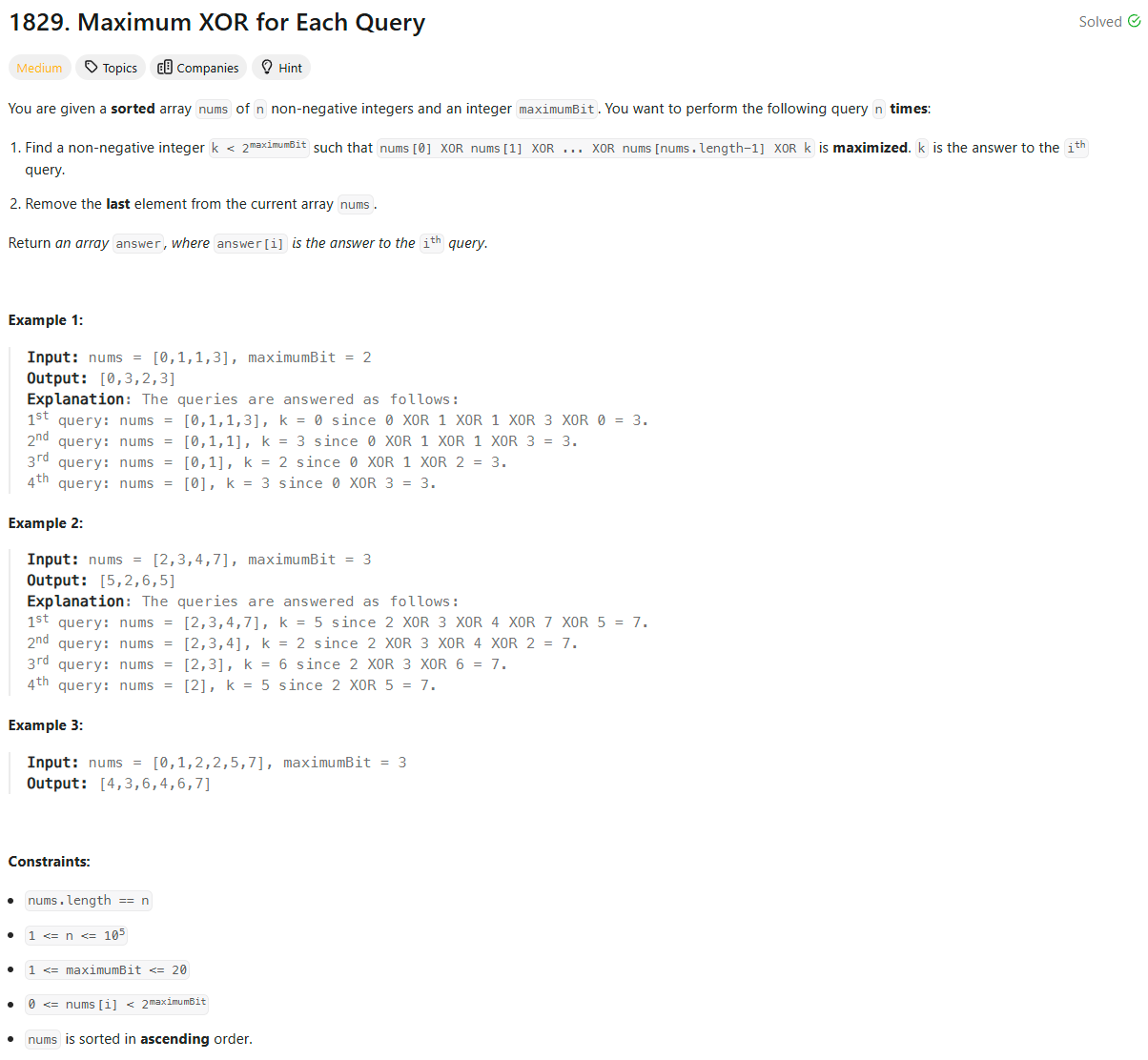Problem of The Day: Maximum XOR for Each Query
Problem Statement

Intuition
The problem requires calculating the maximum XOR for each element in a list of prefix XORs. The idea is to use the XOR operation’s properties to derive each maximum XOR efficiently. Specifically, by targeting the maximum possible value based on maximumBit, we can find the optimal XOR result by using a reverse prefix XOR calculation.
Approach
-
Prefix XOR Calculation:
- We start by iterating over each element in the input list
numsto calculate the prefix XOR. This accumulates the XOR result up to each index and stores it in theprefixarray.
- We start by iterating over each element in the input list
-
Target Calculation:
- To maximize the XOR result, we calculate the largest possible value we can XOR against, which is
2^maximumBit - 1. This ensures all bits up tomaximumBitare set to 1.
- To maximize the XOR result, we calculate the largest possible value we can XOR against, which is
-
Reverse XOR and Result Construction:
- For each prefix XOR (starting from the end of the list), we XOR it with the target to get the desired maximum XOR value.
- We store each result in
res, building it in reverse order.
Complexity
-
Time complexity:
The algorithm iterates overnumstwice (once to calculate the prefix XORs and once to build the result list), making the time complexity \(O(N)\) whereNis the length ofnums. -
Space complexity:
The algorithm uses two additional lists of sizeN, one for storing the prefix XORs and one for the results. Thus, the space complexity is \(O(N)\).
Code
class Solution:
def getMaximumXor(self, nums: List[int], maximumBit: int) -> List[int]:
N = len(nums)
curr = 0
prefix = [0] * N
for i, num in enumerate(nums):
curr = curr ^ num
prefix[i] = curr
res = [0] * N
target = 2**maximumBit - 1
for i in range(N):
k = prefix[N - i - 1] ^ target
res[i] = k
return res
Editorial
Approach 1: Prefix Array + Bit Masking
class Solution:
def getMaximumXor(self, nums: List[int], maximumBit: int) -> List[int]:
prefix_xor = [0] * len(nums)
prefix_xor[0] = nums[0]
for i in range(1, len(nums)):
prefix_xor[i] = prefix_xor[i - 1] ^ nums[i]
ans = [0] * len(nums)
mask = (1 << maximumBit) - 1
for i in range(len(nums)):
# find k to maximize value
current_xor = prefix_xor[len(prefix_xor) - 1 - i]
ans[i] = current_xor ^ mask
return ans
- time: O(n)
- space: O(n)
Approach 2: Optimized Calculation + Bit Masking
class Solution:
def getMaximumXor(self, nums: List[int], maximumBit: int) -> List[int]:
xor_product = 0
for i in range(len(nums)):
xor_product = xor_product ^ nums[i]
ans = [0] * len(nums)
mask = (1 << maximumBit) - 1
for i in range(len(nums)):
ans[i] = xor_product ^ mask
# remove last element
xor_product = xor_product ^ nums[len(nums) - 1 - i]
return ans
- time: O(n)
- space: O(1)